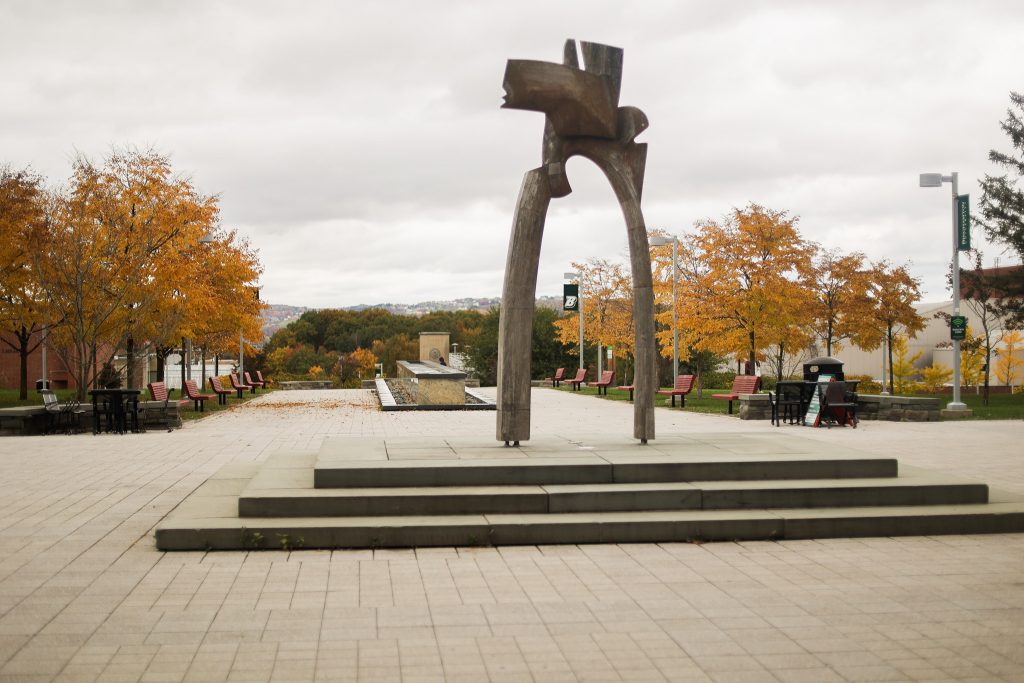Amid growing violence in the Middle East, several student-led multicultural organizations have released statements in support of the Palestinian people and criticizing Binghamton University President Harvey Stenger’s messages to the campus community last week.
On Oct. 11, Stenger offered condolences for “the loss of innocent lives due to [the] terrorist atrocities,” calling for respectful discourse on campus. Two days later, he announced a heightened Binghamton’s New York State University Police (UPD) presence and escorts for Jewish students in response to Hamas’s call for a “day of rage,” promising to engage with Jewish community members to address safety concerns.
The multicultural community’s response follows this month’s “Rally for Palestinian Solidarity,” led by BU’s Students for Justice in Palestine (SJP) chapter, which was met with counterprotesters and a police presence.
“The Palestinian struggle is one that many minority groups and people of other cultures understand very well,” SJP’s E-Board wrote. “A struggle against colonialism and imperialism [is] one that many multicultural groups are very familiar with. They know what it’s like to be underrepresented, to have their voice silenced. And for that, they advocate so strongly for the Palestinian cause, not only because we are united in suffering, but because we have all been put down, silenced and dehumanized the same way.”
Organizations that have released statements include the Black Student Union (BSU), the Latin American Student Union (LASU), the Muslim Student Association (MSA), Thurgood Marshall Pre Law Society (TMPS), the Caribbean Student Association (CSA), the Dominican Student Association (DSA) and others. They mourned all the lives lost, reaffirmed Palestinians’ human rights, shared resources for humanitarian aid to Gaza and criticized the University’s response.
“You have failed to ease the tension felt on this campus,” LASU’s statement read, addressing Stenger. “There are Arab, Muslim and Palestinian students who see right through your emails and feel a lack of support.”
A University spokesperson did not provide comment in response to a Pipe Dream request.
TMPS’s E-Board said that their mission as a social justice organization compelled them to support the Palestinian cause.
“We feel that it is imperative to speak on pressing matters of injustice happening around the world, especially when genocide is unfolding right in front of our eyes,” the E-Board wrote. “We recognize our privilege as individuals watching this tragedy occur on the outskirts, so the least we can do is talk about what’s happening and help pressure our government to stop funding this violence that jeopardizes the humanity of Palestinians. It is important that we come together to provide support to the Palestinian community on campus, especially considering how university leaders have expressed their one-sidedness on this issue.”
Continued activism at BU mirrors a trend across college campuses nationwide. At Harvard University, a statement from the Palestine Solidarity Committee holding the “Israeli regime entirely responsible for all unfolding violence” was initially cosigned by over 30 student organizations before receiving intense backlash from administrators, alumni and elected leaders, according to reports from the Harvard Crimson.
Donna Villa, LASU’s political correspondent and a junior double-majoring in political science and history, expanded on why the organization spoke out.
“As a leftist organization, we know where our support lies when we witness colonization in modern day,” Villa wrote. “After a couple E-Board members attended the rally and everything unraveled on campus with the rally and [Stenger’s] statements, I knew that it was important to condemn [him], as well. He doesn’t have all students in his thoughts, and it’s quite disheartening, as he is supposed [to] make calls for all students and not just [one] group.”
SJP added that the multicultural groups acted independently in releasing their statements.
“We didn’t have to convince nor educate any of them about the conflict,” the E-Board wrote. “For many of those who don’t have a voice, our only hope is for us to band together and empower one another. That is why the multicultural [organizations] have stood up for us, and we hope that our concerns reach the president.”



